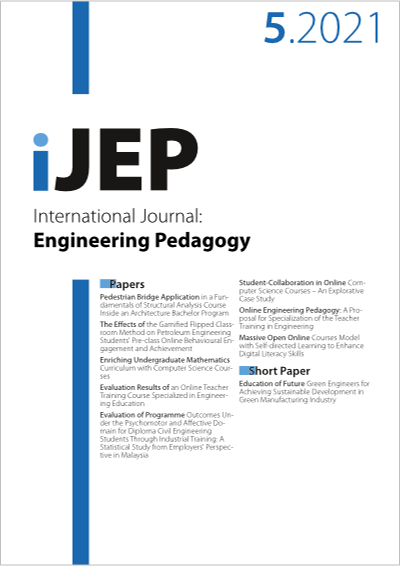The Effects of the Gamified Flipped Classroom Method on Petroleum Engineering Students' Pre-class Online Behavioural Engagement and Achievement
DOI:
https://doi.org/10.3991/ijep.v11i5.21957Keywords:
flipped Learning, gamification, higher education, online behaviorAbstract
The flipped learning is a widely-used teaching method that increases the interaction between the instructor and the students by changing the in-class instructional time and the out-of-class practices. In this method, if students come to the class without studying the pre-course materials, this might lead to failures in its application. Besides, the gamified flipped learning environment was obtained by integrating the gamification elements in the pre-class phase of the flipped learning. The effects of teaching in this environment on students’ online behaviors and achievements were investigated. The participants were fourth-year undergraduate petroleum and natural gas engineering students enrolled in a natural gas engineering course. A true-experimental design was used in the study. Data were collected from a natural gas concept test, weekly quizzes, and data logs from Moodle. The research results indicated that teaching in the gamified flipped learning method showed a significant increase in the students’ participation in the pre-class activities of the flipped learning compared to the control group. Moreover, there was a significant increase in the achievement levels of the experimental group as compared to the control group. Based on these findings, the use of gamification elements in the pre-class phase of the flipped learning method can have a positive effect on the pre-course online behavior engagements of students. Furthermore, it was determined that it has a positive effect on the achievements of students who completed the method.
Downloads
Published
2021-10-05
How to Cite
Asiksoy, G., & Canbolat, S. (2021). The Effects of the Gamified Flipped Classroom Method on Petroleum Engineering Students’ Pre-class Online Behavioural Engagement and Achievement. International Journal of Engineering Pedagogy (iJEP), 11(5), pp. 19–36. https://doi.org/10.3991/ijep.v11i5.21957
Issue
Section
Papers



